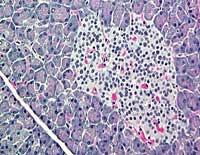Non-immunosuppressive transplants against diabetes
Insulin is a hormone that controls the blood glucose level and type 1 diabetes is due to the lack of cells in the area that produces it. Therefore, patients should take the dose of insulin they need two or three times a day by injection. It was recently announced that they could also breathe through the airway (see "New respiration for diabetics", 02/09/2001) but, despite being more comfortable, they must continue to engage insulin, so many efforts are made to avoid it.

Among these trials, transplantation is the one that generates the most expectations. In fact, a group of Canadian researchers triumphed last year with the transplant of sand cells that secrete insulin (islands of Langerhans). The most serious problem of the transplants carried out so far was rejection, but a suitable drug was found to avoid rejection and transplanted patients exceeded the need for insulin.
The drugs used to prevent rejection generate immunodeficiency, thus preventing the body from opposing external cells. But in the long term they increase the risk of infections and autoimmune diseases can occur. Therefore, the next step was to get these drugs not used.
Researchers at the University of Alabama transplanted 11 monkeys islands from other monkeys in Langerhans. These monkeys received for two weeks a drug to produce immunodeficiency and another anti-inflammatory drug. After that time, the drugs were removed and a year later, four monkeys plus medications and were healthy without the need for external insulin.
The result opens the door to clinical tests in humans. However, there are more problems, such as obtaining donors, which are now investigating with stem cells to prevent the use of dead cells. If all these investigations are as soon as possible beneficial.
Buletina
Bidali zure helbide elektronikoa eta jaso asteroko buletina zure sarrera-ontzian











